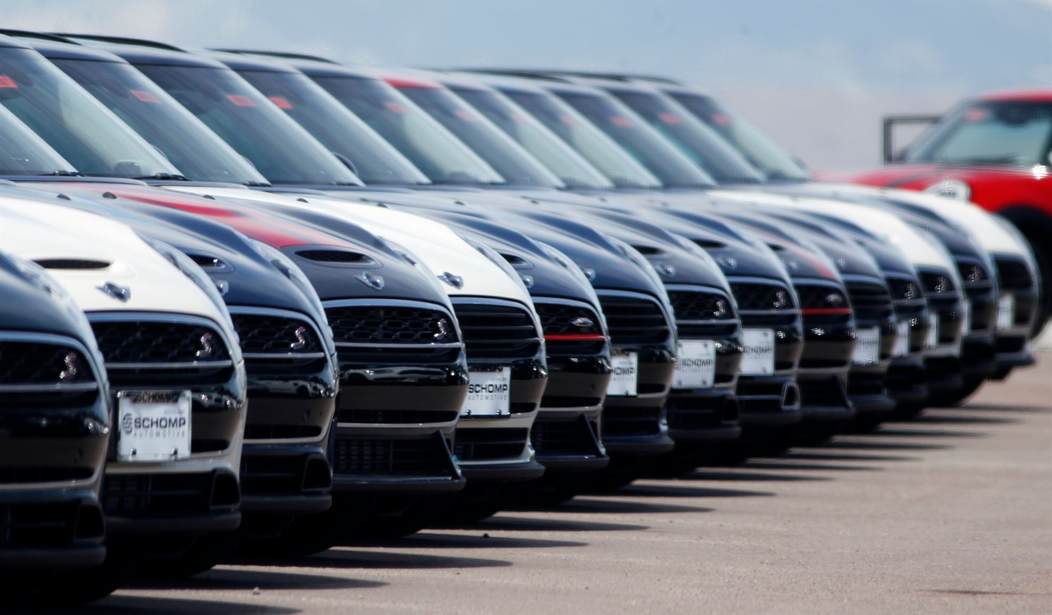(The opinions expressed by contributors are their own and do not necessarily represent the views of RedState.com.)
Supply-chain issues and poorly stocked dealerships plagued US auto companies in 2022, leading to an eight percent decrease in domestic sales and the lowest number of purchases in more than a decade.
But the Biden economy’s doing great, folks.
2022 U.S. Auto Sales YoY Change
Nissan — Down 25%
Toyota — Down 9.6%
Subaru — Down 4.7%
Tesla — Up 40%— Whole Mars Catalog (@WholeMarsBlog) January 5, 2023
The good news however is that General Motors was one of the few companies to report an increase and took the US sales crown back from Toyota, which earned the top spot in 2021.
The Wall Street Journal breaks down the numbers:
Industrywide, U.S. auto sales totaled 13.7 million vehicles in 2022, the lowest figure since 2011 and an 8% decrease from the prior year, according to the research firm Wards Intelligence. Sales had topped 17 million vehicles for five straight years before the Covid-19 pandemic struck in 2020, unleashing supply-chain problems that have bogged down deliveries ever since.
Computer chip shortages plagued many companies, hobbling Toyota’s production among others. The war in Ukraine has also contributed to the problem, as sanctions and severed trade routes are making an impact.
“When we started the year off, the whole industry had projections all above 16 million,” said Jack Hollis, Toyota’s North American sales chief. Companies quickly ditched their projections as factories were forced to shut down or slow production.
Toyota has posted a 9.6% fall in its 2022 US new vehicle sales as a shortage of semiconductor chips and rising costs hampered the Japanese automaker's production earlier in the year.#Toyota #Sales #US #USAhttps://t.co/05ZYvmDOj1
— Hive PR MENA (@hiveprme) January 5, 2023
Adding to Detroit’s woes: inflation and high interest rates. I don’t know about you, but I’m holding on to my six-year-old Ford Explorer till they pry it from my cold, dead hands. Not only has the rising cost of goods eaten into what little discretionary spending I had available, but the Fed’s repeated rate hikes have also left the average auto loan rate at 5.16 percent for new cars and 9.34 percent for used cars.
Hell naw.
While some auto executives are hopeful for a better 2023, a possible (probable?) recession has them concerned:
“We expect 2023 to carry a high level of risk and uncertainty as several markets could be dealing with a recession,” said Jeff Schuster, president of global forecasts at LMC Automotive.
Fortunately, if you have an extra $66,000 hanging around (the average price of an electric vehicle), you can ignore the fact that its battery is probably produced by slave labor and get a fancy new EV. Joe’s got your back:
If you’re in the market for a car, you can now get a tax credit to buy a new or used electric vehicle. And if you get an EV, you can mute my social media posts about gas prices.
Here are the EV models currently eligible for new vehicle tax credits: https://t.co/rF5wXSF5DF
— President Biden (@POTUS) January 1, 2023
Overbearing COVID policies and the war in Ukraine both contributed to supply chain issues, and Biden’s inflation cramped the wallets of all but the wealthiest Americans. The truth is, only those that absolutely need a new vehicle—or are just plain wealthy—will likely be looking for one this year. From the New York Times:
Analysts expect that higher rates and a slowing economy will force some U.S. shoppers to delay car purchases or steer away from showrooms altogether in 2023 even if automakers crank out more vehicles than they did last year because they can get more parts.
The reality is until the administration gets inflation under control—and the big-spending “Inflation Reduction Act” will almost assuredly not achieve that goal—many folks are simply going to hold off on big purchases for the foreseeable future.
Elections have consequences.














Join the conversation as a VIP Member